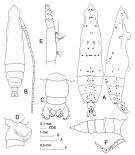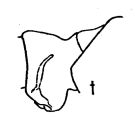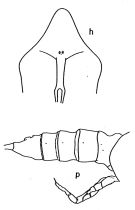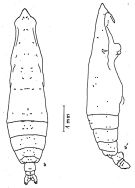|
|
 |
Fiche d'espèce de Copépode |
|
|
Calanoida ( Ordre ) |
|
|
|
Eucalanoidea ( Superfamille ) |
|
|
|
Eucalanidae ( Famille ) |
|
|
|
Pareucalanus ( Genre ) |
|
|
| |
Pareucalanus langae (Fleminger, 1973) (F,M) | |
| | | | | | | Syn.: | Eucalanus langae Fleminger, 1973 (p.969, 978, 979, 996, 998, figs.F, fig.17); Geletin, 1976 (p.83); Van der Spoel & Heyman, 1983 (p.42, fig.54);
Eucalanus attenuatus : Bradford, 1970 a (p.353, figs.F,M, Rem..).
| | | | Ref.: | | | Bradford-Grieve, 1994 (p.80, figs.F,M, fig. 100); Bradford-Grieve & al., 1999 (p.878, 912, figs.F,M); Goetze, 2003 (p.2322 & suiv.); Goetze & Ohman, 2010 (p.2110, Table 1, A1, Fig.15, molecular study, biogeography) |  issued from : J.M. Bradford-Grieve in The Marine Fauna of New Zealand: Pelagic Calanoid Copepoda. National Institute of Water and Atmospheric Research (NIWA). New Zealand Oceanographic Institute Memoir, 102, 1994. [p.81, Fig.43]. Female (from Fleminger, 1973, p.991, fig.15 b. As Eucalanus langae): A, habitus (dorsal and lateral pattern of integumental organs (black point = sites occuring at 100% frequency, o = 80-99% frequency, x = 10-79% frequency, triangle are sites which are also visible in lateral view but which are assigned to dorsal sets). Female (from south-west Pacific): B, habitus (dorsal); C, urosome (dorsal); D, genital segment (lateral right side); E, Md (mandibular palp). Male (from Fleminger, 1973, p.994, Fig.18p. As Eucalanus langae): F, urosome and P5 (lateral right side).
|
 issued from : A. Fleminger in Fishery Bull. natn. Ocean. Atmos. Adm., 1973, 71 (4). [p.968, Fig.1, t (p.969). As Eucalanus langae. Female: t, genital segment (lateral right side).
|
 issued from : A. Fleminger in Fishery Bull. natn. Ocean. Atmos. Adm., 1973, 71 (4). [p.994, Fig.18]. As Eucalanus langae. Female (from 32°29'S, 09°04'E): h, forehead (ventral) Male (31°11'S, 00°56'E): p, urosome and P5 (lateral right side).
|
 issued from : A. Fleminger in Fishery Bull. natn. Ocean. Atmos. Adm., 1973, 71 (4). [p.991, Fig.15 Ab, Bb]. As Eucalanus langae. Female: a, habitus (dorsal); a', idem (lateral right side). Dots represent sites occuring at a frequency of 100% in the pooled sample of the species, open circles are sites appearing in 80 to 99%, crosses are sites occupied in from 10 to 79%. Open triangles are sites also visible in lateral view but assigned to tergal sets.
|
 issued from : J.M. Bradford in N.Z. Jl Mar. Freshw. Res., 1970, 4 (4). [p.352, Figs 6-9]. As Eucalanus attenuatus. Female (off Kaikoura, New Zealand): 9, urosome (dorsal). Male: 6, Md (mandibular palp); 7, P5; 8, urosome (dorsal). Scale bars represent 0.1 mm. Nota: The New Zealand specimens differ from Giesbrecht's (1892) description in details of the mandibular palp: basipod 2 bears 4 small setae; the endopod of segment 1 has 2 small setae, segment 2 has 5 setae (2 of which are slenderer than the rest). The females and stage V males from New Zealand only the anal segment is hairy and the adult males have a naked urosome.
| | | | | Ref. compl.: | | | Hsiao & al., 2004 (p.325, tab.1); Lan & al., 2004 (p.332, tab.1); Dur & al., 2007 (p.197, Table IV, as Paraeucalanus langae : lapsus calami); Schnack-Schiel & al., 2010 (p.2064, Table 2: E Atlantic subtropical/tropical); Hsiao S.H. & al., 2011 (p.475, Appendix I); Jerez-Guerrero & al., 2017 (p.1046, Table 1: temporal occurrence) | | | | NZ: | 8 | | |
|
Carte de distribution de Pareucalanus langae par zones géographiques
|
| | | | | | | | |  issued from : A. Fleminger in Fishery Bull., 1973, 71 (4). [p.993, Fig.17]. As Eucalanus attenuatus. issued from : A. Fleminger in Fishery Bull., 1973, 71 (4). [p.993, Fig.17]. As Eucalanus attenuatus.
Geographical localities of the species in the attenuatus group. All identifications except those of Park (1968) and Bradford (1970) verified by examination of integumental organs. |
 Issued from : E. Goetze & M.D. Ohman in Deep-Sea Res. II, 2010, 57. [p.2125, Fig.15]. Issued from : E. Goetze & M.D. Ohman in Deep-Sea Res. II, 2010, 57. [p.2125, Fig.15].
Biogeographic distribution of Pareucalanus langae, a circumglobal transition zone species in the southern hemisphere.
Solid circles mark sampling locations of specimens whose species identity was verified by DNA sequencing of 165 rRNA.
Fleminger (1973) records of this species are plotted as open squares. Lang records of 'cold-water form' specimens are plotted. |
| | | | Loc: | | | South Africa, SE Atlant., S Indian, China Seas (East China Sea, South China Sea), Taiwan (SW, E, NW, N: Mienhua Canyon), Bahia Cupica (Colombia), New Zealand, S Pacif., off Chile, | | | | N: | 12 | | | | Lg.: | | | (79) F: 7,22-6,44; M: 6,59-6,12; (313) F: 6,6; 6,7; M: 6,35; 6,30; {F: 6,44-7,22; M: 6,12-6,59} | | | | Rem.: | Epipélagique - ?.
Voir aussi les remarques en anglais | | | Dernière mise à jour : 14/06/2022 | |
|
|
 Toute utilisation de ce site pour une publication sera mentionnée avec la référence suivante : Toute utilisation de ce site pour une publication sera mentionnée avec la référence suivante :
Razouls C., Desreumaux N., Kouwenberg J. et de Bovée F., 2005-2026. - Biodiversité des Copépodes planctoniques marins (morphologie, répartition géographique et données biologiques). Sorbonne Université, CNRS. Disponible sur http://copepodes.obs-banyuls.fr [Accédé le 07 janvier 2026] © copyright 2005-2026 Sorbonne Université, CNRS
|
|
 |
 |










